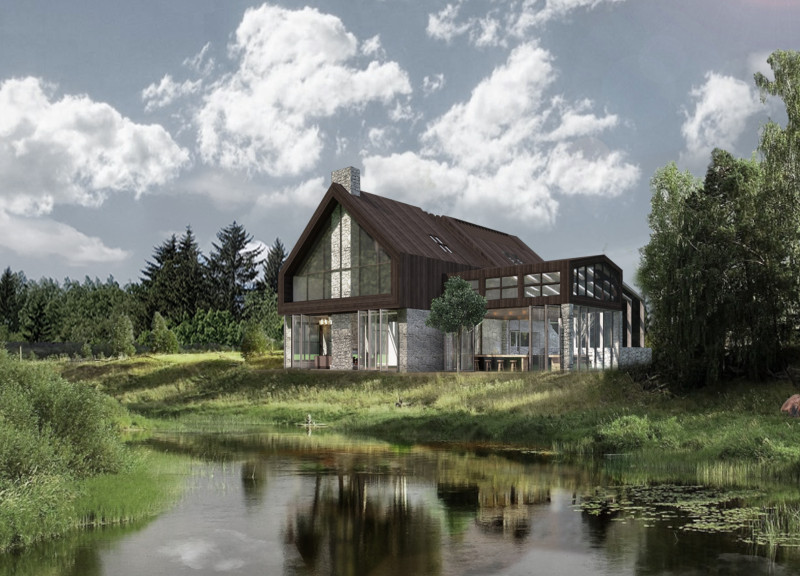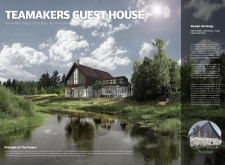5 key facts about this project
The Teamakers Guest House project represents a thoughtful renovation of an existing structure originally used for tea storage in Ozolini, Latvia. This architectural design transforms the former barn into an eco-friendly guesthouse, integrating seamlessly into the natural environment. The project prioritizes sustainability, focusing on energy efficiency and minimal environmental impact while providing a serene retreat for visitors. The design emphasizes a close relationship between the building and its surroundings, achieving a harmonious balance between nature and human habitation.
Sustainable Design Approaches
The architectural design employs various strategies to maintain a low ecological footprint. Notably, the project features extensive use of natural materials, including walnut wood, white oil wood, teak wood, and seamless stone walls. These materials not only enhance the aesthetic quality of the guesthouse but also ensure durability and sustainability. Large glass facades create a connection to the natural landscape while allowing ample daylight to penetrate the interiors, thus reducing the dependence on artificial lighting. The strategic placement of windows facilitates natural ventilation, improving air quality and comfort.
The inclusion of sustainable features further distinguishes this project. Rainwater harvesting systems are integrated to manage water resources effectively, while solar panels harness renewable energy to support the building’s power requirements. These systems reflect a commitment to an environmentally conscious design, making the guesthouse a self-sustaining facility.
Functional Layout and Unique Elements
The layout of the Teamakers Guest House is designed to maximize comfort and functionality, offering distinct spaces that serve specific purposes while maintaining a cohesive aesthetic. The living room, characterized by large windows, serves as a gathering space that encourages interaction while blurring the boundaries between the interior and exterior. A dedicated tea-making area allows guests to engage with tea culture, fostering a sense of community and shared experience.
Unique architectural elements, such as the meditation space with an open ceiling design, create an ambiance conducive to reflection and tranquility. The bedrooms are strategically positioned to offer expansive views of the surrounding landscape, promoting relaxation and comfort. This attention to the spatial arrangement underscores the project's commitment to providing a restorative environment for visitors.
For those interested in a deeper understanding of this project, exploring the architectural plans, sections, designs, and ideas will offer valuable insights into its design philosophy and execution. The Teamakers Guest House exemplifies a modern approach to architecture that respects nature and enhances the guest experience through thoughtful design principles.


















































